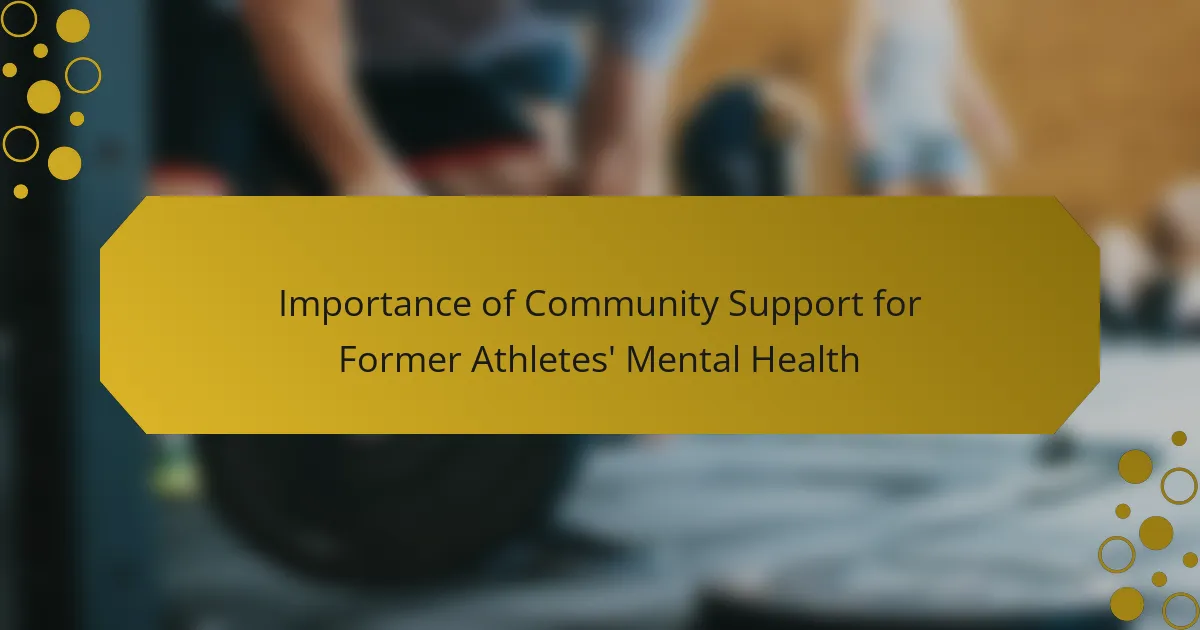Community support is vital for enhancing the mental health of former athletes, addressing challenges like identity loss and isolation. Engaging with peers fosters connection and reduces loneliness. Support networks provide resources for mental health services and promote emotional resilience. Unique initiatives such as mentorship programmes and peer support groups further aid in navigating life transitions effectively.
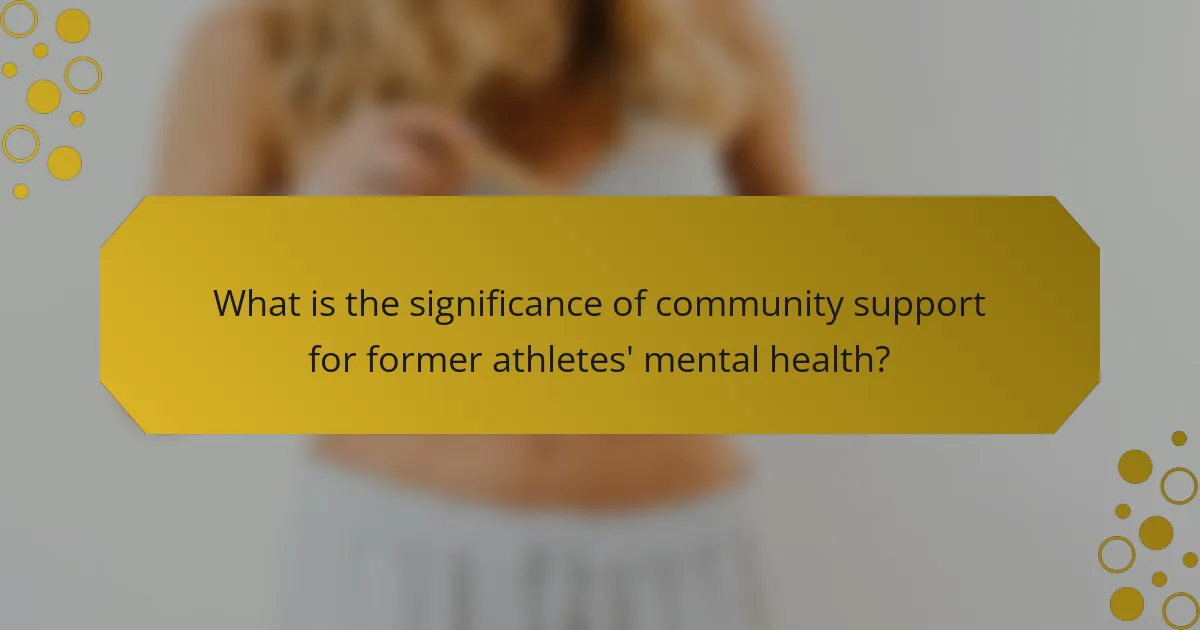
What is the significance of community support for former athletes’ mental health?
Community support is crucial for former athletes’ mental health as it fosters belonging and reduces isolation. Engaging with supportive networks can alleviate feelings of depression and anxiety, which are common post-retirement. Studies indicate that social connections significantly enhance emotional well-being, providing a buffer against mental health challenges. Regular interaction with peers and mentors can instil a sense of purpose, helping former athletes navigate life transitions effectively.
How does community support impact emotional well-being?
Community support significantly enhances emotional well-being for former athletes by providing a sense of belonging and shared experience. This support system mitigates feelings of isolation, which can lead to mental health challenges. Research indicates that athletes who engage with their community report lower levels of anxiety and depression. Additionally, social connections foster resilience and coping strategies, essential for navigating post-athletic life. The unique attribute of peer support creates a safe space for discussing mental health, enhancing overall emotional stability.
What role does social connection play in recovery?
Social connection is crucial in recovery as it fosters resilience and provides emotional support. Community support helps former athletes navigate mental health challenges by reducing feelings of isolation. Engaging with peers who share similar experiences enhances motivation and accountability. Studies show that strong social ties can lead to improved psychological well-being and faster recovery rates. As a result, building a supportive network is essential for successful reintegration into daily life after athletic careers.
What are the key components of effective social support?
Effective social support for former athletes includes emotional, informational, and tangible assistance. Emotional support involves empathy and understanding, which helps alleviate feelings of isolation. Informational support provides guidance and resources for mental health challenges, while tangible support includes financial aid and access to services. These components foster resilience and enhance mental well-being, addressing the unique challenges faced by former athletes.

What universal challenges do former athletes face regarding mental health?
Former athletes often struggle with mental health challenges due to loss of identity, isolation, and lack of community support. Community support plays a crucial role in addressing these issues. Engaging with peers who understand their experiences fosters connection and reduces feelings of loneliness. Research indicates that social support can significantly lower anxiety and depression levels among former athletes. Additionally, organised group activities can provide a sense of purpose and belonging, which are essential for mental well-being. Establishing strong community ties can ultimately enhance resilience and promote healthier transitions into post-athletic life.
How do identity issues affect former athletes post-career?
Identity issues significantly impact former athletes’ mental health, often leading to feelings of isolation and loss. Community support plays a vital role in alleviating these challenges. Engaging with peers who understand their experiences fosters a sense of belonging, reducing anxiety and depression. Studies show that social connections can enhance emotional resilience, making it crucial for former athletes to seek supportive networks. Programmes that encourage collaboration and shared experiences can help rebuild identity and purpose post-career.
What common mental health disorders are prevalent among former athletes?
Common mental health disorders among former athletes include depression, anxiety, and substance abuse. These conditions often arise due to identity loss, lack of structure, and reduced social support after retirement. Community support plays a crucial role in mitigating these issues. Engaging with peers and mental health professionals can foster resilience and promote recovery. Studies indicate that former athletes with strong community ties report better mental health outcomes.
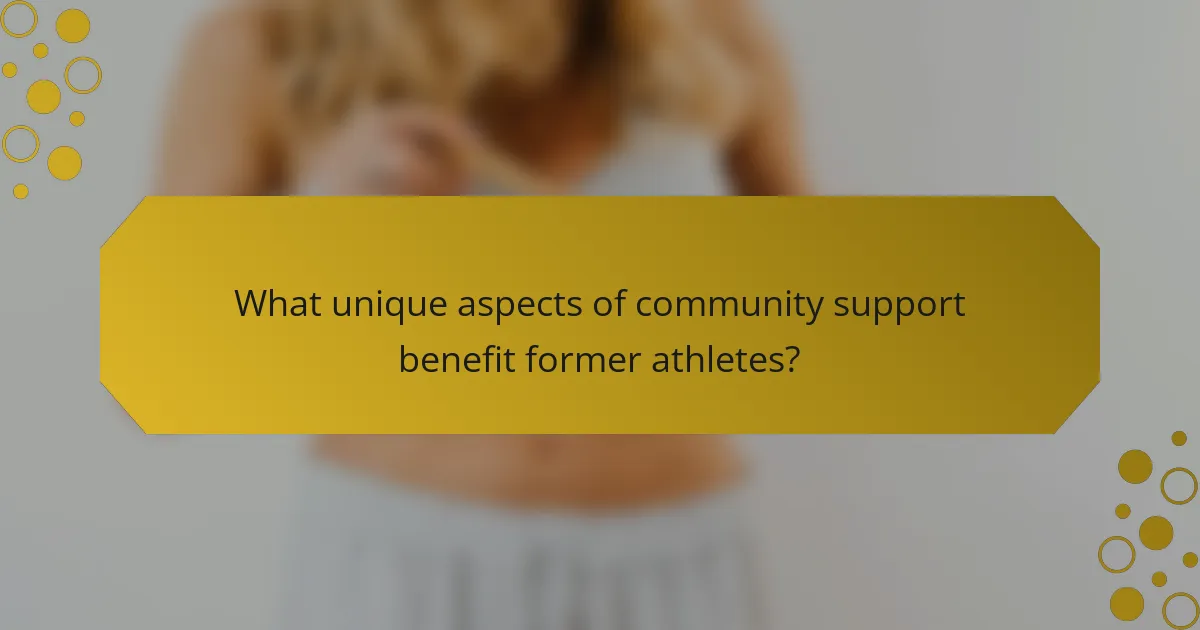
What unique aspects of community support benefit former athletes?
Community support significantly enhances former athletes’ mental health by fostering connection and reducing isolation. Engaging with peers who understand their unique experiences helps them navigate identity transitions. Additionally, support networks provide resources for mental health services, creating a safety net during challenging times. Studies show that social interaction can lower anxiety levels and improve overall well-being, making community involvement essential for emotional resilience.
How can peer mentorship enhance mental health outcomes?
Peer mentorship significantly enhances mental health outcomes for former athletes by fostering community support. This connection reduces feelings of isolation, providing emotional understanding and shared experiences. Research indicates that peer mentorship can lead to a 30% improvement in mental well-being among participants, as they engage in open discussions about challenges and coping strategies. Furthermore, the unique attribute of peer mentorship lies in its ability to create trust, allowing individuals to express vulnerabilities without judgment. As a result, former athletes can build resilience and develop healthier coping mechanisms through supportive relationships.
What role do sports organisations play in providing support?
Sports organisations play a crucial role in supporting former athletes’ mental health by providing resources, community engagement, and professional guidance. They offer programmes focused on mental wellness, helping athletes transition to life after sports. These initiatives can include counselling services, peer support groups, and workshops that address mental health challenges unique to former athletes. Additionally, sports organisations foster a sense of belonging, reducing feelings of isolation and promoting overall well-being. By prioritising mental health, they enhance the quality of life for athletes post-career.
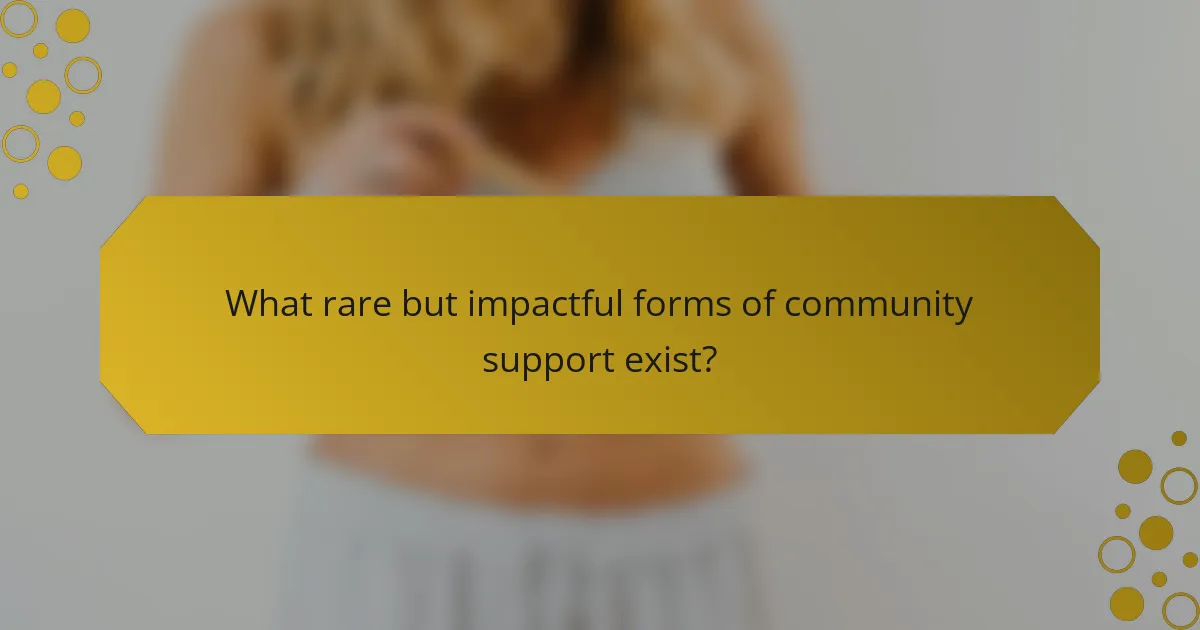
What rare but impactful forms of community support exist?
Rare forms of community support for former athletes include mentorship programmes, peer support groups, and wellness retreats. These initiatives provide unique environments that foster emotional healing and resilience. Mentorship programmes connect former athletes with experienced professionals, offering guidance in career transitions. Peer support groups create safe spaces for sharing experiences and coping strategies. Wellness retreats focus on holistic health, combining physical activity with mental wellness practices. These approaches can significantly enhance mental health outcomes by addressing the specific challenges faced by former athletes.
How can specialised support groups address unique athlete experiences?
Specialised support groups can significantly improve mental health for former athletes by fostering a sense of belonging. These groups create safe spaces where athletes share unique experiences and challenges related to their transition from competitive sports.
Peer support can address feelings of isolation and anxiety, common among former athletes. For instance, studies show that athletes who engage in community support report higher emotional well-being.
Additionally, these groups often provide resources tailored to athletes, such as mental health workshops and coping strategies. This targeted support helps members navigate the psychological impacts of retirement from sports, enhancing their overall quality of life.
Lastly, the unique attribute of shared experiences within these groups allows for deeper connections and understanding, fostering resilience and personal growth among participants.
What innovative programmes are emerging to support former athletes?
Emerging programmes supporting former athletes focus on community engagement and mental health resources. Initiatives like peer support groups and mentorship programmes foster connection and shared experiences. These platforms provide a safe space for athletes to discuss challenges and seek guidance. Research indicates that community support significantly improves mental well-being, reducing feelings of isolation. Programmes emphasising holistic health, including workshops on coping strategies and career transitions, further enhance the support network for former athletes.
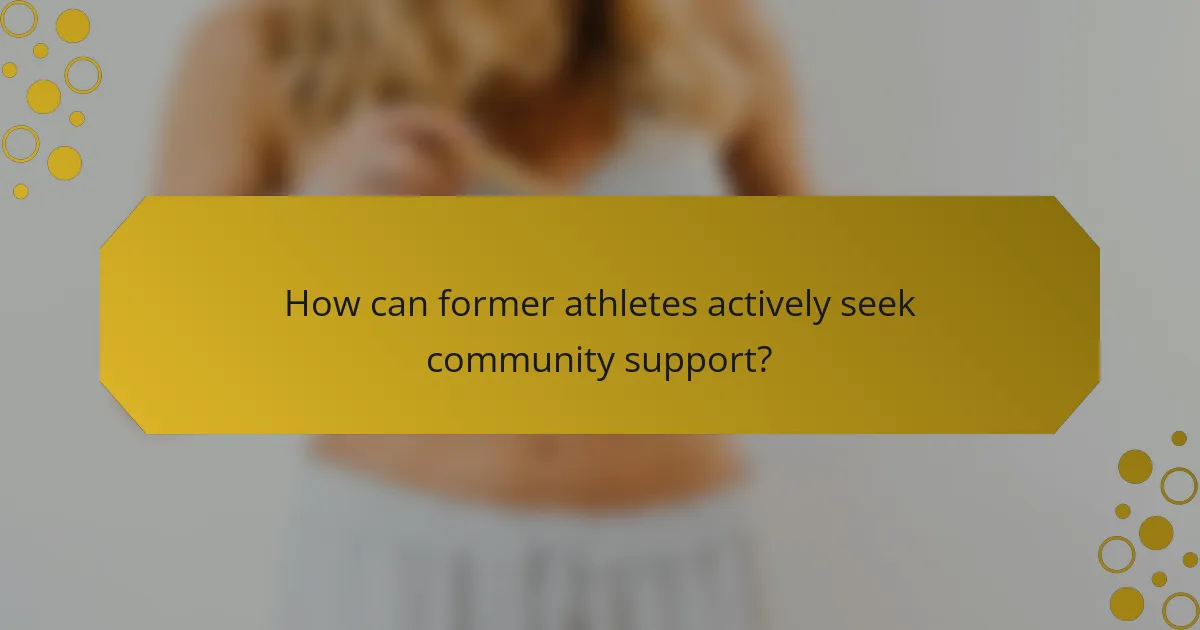
How can former athletes actively seek community support?
Former athletes can actively seek community support through various strategies. Engaging with local sports clubs fosters connections and shared experiences. Participating in support groups offers a safe space for discussing challenges and emotions. Volunteering in community events can create a sense of purpose and belonging. Utilising online platforms connects athletes with peers facing similar transitions. Establishing mentorship relationships can provide guidance and encouragement. These actions enhance mental health by reinforcing social ties and reducing feelings of isolation.
What strategies can former athletes use to build supportive networks?
Former athletes can build supportive networks by engaging with local sports clubs, joining alumni associations, and participating in community events. These strategies foster connections and provide emotional support. Establishing mentorship roles can also create a reciprocal relationship that enhances mental well-being. As a result, these networks can significantly reduce feelings of isolation and promote mental health resilience among former athletes.
What resources are available for connecting with others?
Connecting with others is crucial for former athletes’ mental health. Resources include support groups, online forums, mentorship programmes, and community events. These platforms foster relationships, share experiences, and provide emotional support. Engaging with peers who understand similar challenges enhances resilience and promotes well-being.
What common mistakes should former athletes avoid when seeking help?
Former athletes should avoid isolation, neglecting mental health resources, and underestimating the importance of community support. Engaging with supportive networks can significantly enhance mental well-being. Many former athletes mistakenly believe they can handle challenges alone, which can lead to increased stress and anxiety. Seeking help from peers who understand their experiences fosters connection and resilience. Additionally, overlooking professional mental health services can prevent effective coping strategies. Building a strong support system is crucial for navigating the transition from competitive sports to everyday life.
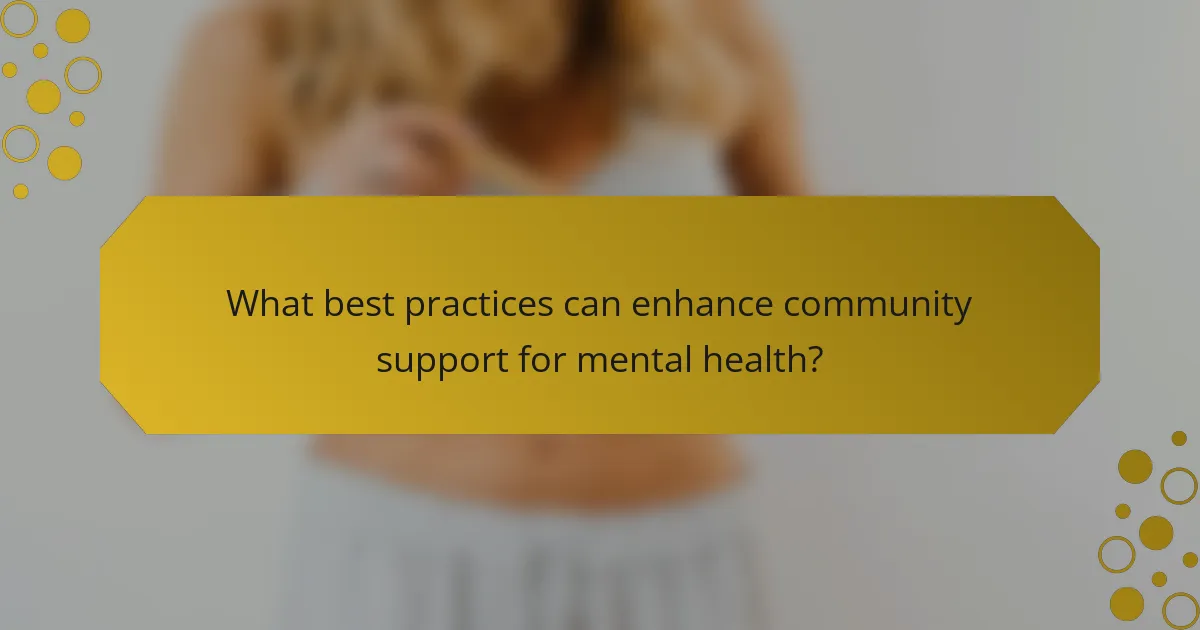
What best practices can enhance community support for mental health?
Community support significantly enhances former athletes’ mental health through various best practices. Establishing peer support groups fosters connection and shared experiences. Regular community events promote engagement and reduce isolation. Educational workshops can increase awareness about mental health challenges. Collaborating with mental health professionals ensures access to resources and guidance. Encouraging open discussions normalises seeking help and strengthens community bonds.
How can community initiatives be tailored to meet athletes’ needs?
Community initiatives can be tailored to meet athletes’ needs by focusing on mental health support, social connections, and personalised programmes. These initiatives should include counselling services, peer support groups, and recreational activities that foster engagement.
Research shows that 30% of former athletes experience mental health challenges post-retirement. Addressing these issues through targeted community programmes can significantly enhance their well-being.
Engagement in community sports can provide a sense of belonging and purpose, crucial for mental health. Initiatives should also consider unique attributes such as the specific sports backgrounds of the athletes to create relevant support systems.
Collaboration with mental health professionals ensures that programmes are effective and responsive to athletes’ evolving needs. Regular feedback from participants can help refine these initiatives, ensuring they remain effective and supportive.
What are the benefits of creating inclusive support environments?
Creating inclusive support environments significantly enhances former athletes’ mental health by fostering connection and understanding. These environments provide emotional safety, reduce feelings of isolation, and promote open communication. Research indicates that social support can lead to improved mental well-being, resilience, and a sense of belonging. Moreover, inclusive settings encourage sharing experiences, which can aid in processing transitions from athletic careers. By prioritising inclusivity, communities can effectively address the unique mental health challenges faced by former athletes.
